



Pagination
Note, page numbering is chronological, and is unique to each section, that is, each form of material. The first article to be published each year will be pp. A.1-12 (for instance); the second article pp. A.13-29, and so on. Page numbers for articles are prefaced by
a capital A. (and so on)—
SECTIONS
Articles :
ERTP Forum :
Essays (Series)
Review Articles :
Conference Papers :
Book Reviews :
Research Updates :
PREFIX
A
EF
ES
RA
CP
BR
RU
Contents : The Evangelical Review
of Theology and Politics Vol. 12, 2024

The Evangelical Review
of Theology & Politics
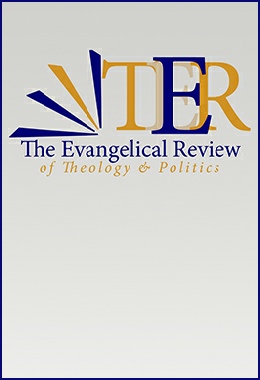
Volume 12, 2024
THE EVANGELICAL REVIEW OF THEOLOGY & POLITICS
VOL. 12, 2024
ARTICLES
Article: 2024-01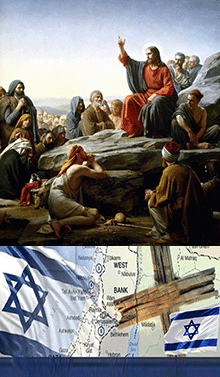 Matthew Wong,
Matthew Wong,
‘An Evaluative Review of the Major Theological and Exegetical Problems Inherent in Supersessionism.’
KEY WORDS
|| Supersessionism || Covenant Theology ||
|| Fulfilment || Covenants || Land of Israel ||
|| Hermeneutics ||
ABSTRACT
Despite renewed interest in the theological relationship between the Church and Israel in recent times, supersessionism remains the default and entrenched position within much of the contemporary Western Church. This article identifies and traces the historical roots of three strains of supersessionism before it presents and critically engages with key supersessionist beliefs. It is argued that one’s position on the Church-Israel relationship is not a matter of soteriological importance but nonetheless has significant hermeneutical and theological implications. Providing an evaluative review of supersessionism’s key dogmas, this paper concludes that inherent theological, hermeneutical, and exegetical weaknesses severely undermine the doctrine’s biblical credentials.
Painting: Carl Bloch (1834-1890), Sermon on the Mount (1877), in Museum of National History at Frederiksborg Castle, Frederiksborg Slot, 3400 Hillerød, Denmark
Uploaded/Published : January 1, 2024 | ERTP Vol 12, 2024, pages, A1-28
Article: 2024-2
Zach Doppelt
‘A Re-evaluation of Anglo-Irish Premillennialism 1789-1914:
Part 1.’
KEY WORDS
|| Historic Premillennialism || Dispensationalism ||
|| Nineteenth Century || Charles Spurgeon || Jewish Restoration ||
|| J. C. Ryle || Eschatology || Futurism || Historicism ||
ABSTRACT Contemporary premillennial interpretations of the last days and the kingdom of God have been largely dominated by two primary interpretations, often described by the nomenclature of “dispensational premillennialism” and “historic premillennialism.” The conclusion is that dispensationalism, though popular in the 19th and 20th centuries, has been replaced by historic premillennialism which is more akin to non-dispensational views of the 19th century and earlier (perhaps summarizing the views of the patristics as well), hence the formation of the term, “historic premillennialism.”
Contemporary premillennial interpretations of the last days and the kingdom of God have been largely dominated by two primary interpretations, often described by the nomenclature of “dispensational premillennialism” and “historic premillennialism.” The conclusion is that dispensationalism, though popular in the 19th and 20th centuries, has been replaced by historic premillennialism which is more akin to non-dispensational views of the 19th century and earlier (perhaps summarizing the views of the patristics as well), hence the formation of the term, “historic premillennialism.”
This article posits the case that this conclusion is reductionist. And, to simplify the premillennial viewpoints down to these two competing interpretations misses the overlapping theological concerns as well as the cultural and contextual milieus that contribute to developing theology. In order to demonstrate, this article will focus on what is commonly called the “long 19th century.” Specifically, this article will begin by comparing contemporary theological thought with writers of the previous century and will then proceed to assess key Anglo-premillennialists from the 19th century.
Uploaded/Published : January 25, 2024 | ERTP Vol 12, 2024, pages, A29-48
Article: 2024-3
Zach Doppelt
‘A Re-evaluation of Anglo-Irish Premillennialism 1789-1914:
Part 2’
KEY WORDS
|| Historic Premillennialism || Dispensationalism ||
|| Nineteenth Century || Charles Spurgeon || John Nelson Darby ||
|| Plymouth Brethren || Eschatology || Futurism || Historicism ||
ABSTRACT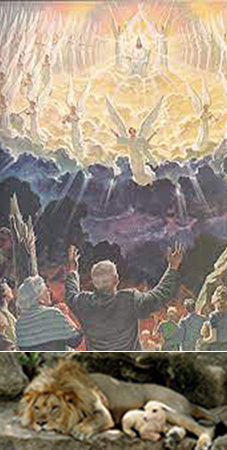 Contemporary premillennial interpretations of the last days and the kingdom of God have been largely dominated by two primary interpretations, often described by the nomenclature of “dispensational premillennialism” and “historic premillennialism.” The oft taught conclusion is that dispensationalism, though popular in the 19th and 20th centuries, has been replaced by historic premillennialism which is more akin to non-dispensational views of the 19th century and earlier, perhaps summarizing the views of the patristics as well (An evaluation of the patristics is outside of the scope of these articles, whereas I will focus primarily on the 19th century and beyond. Likely, one can find premillennial support for many views in the patristic writings though the evidence is scant enough to claim any contemporary perspective as identical to the early church writings.), hence the formation of the term, ”historic premillennialism.”
Contemporary premillennial interpretations of the last days and the kingdom of God have been largely dominated by two primary interpretations, often described by the nomenclature of “dispensational premillennialism” and “historic premillennialism.” The oft taught conclusion is that dispensationalism, though popular in the 19th and 20th centuries, has been replaced by historic premillennialism which is more akin to non-dispensational views of the 19th century and earlier, perhaps summarizing the views of the patristics as well (An evaluation of the patristics is outside of the scope of these articles, whereas I will focus primarily on the 19th century and beyond. Likely, one can find premillennial support for many views in the patristic writings though the evidence is scant enough to claim any contemporary perspective as identical to the early church writings.), hence the formation of the term, ”historic premillennialism.”
This second article of two posits the case that this conclusion is reductionist. And, to simplify the premillennial viewpoints to these two competing interpretations misses the overlapping theological concerns as well as the cultural and contextual milieus that contribute to developing theology. In order to demonstrate the aforementioned thesis, this article will focus on what is commonly called the “long 19th century” as a focus. Here, Irish premillennialist authors will be evaluated with a specific focus on the “Plymouth Brethren.” The resulting analysis will then be compared with British premillennial authors. Finally, the article will present some possible ways forward in theological discourse for premillennialism as a whole.
Uploaded/Published : January 25, 2024 | ERTP Vol 12, 2024, pages, A49-66
Article: 2024-4
Daniel Kirkpatrick
‘Seminaries Headed for a Cliff:
A Problem & Proposal for Christian Seminaries’
KEY WORDS
|| Seminaries || Population Cliff || Statistics || Christian Higher Education ||
|| Enrollment Decline || Demographics ||
ABSTRACT Termed the “population cliff” of 2025 by demographers, a reference to a sharp population decline in the number of college-eligible 18 year olds, institutions of higher education are considering how to navigate their future in light of a lower-than-normal recruitment base attributed to the decline in birth rates stemming from the Great Recession of 2008. Christian seminaries, many of which are already struggling in student enrollment and finances, are particularly vulnerable due to their lack of diversification in program offerings, their traditional modalities of delivery, and their small endowments. If seminaries are dependent primarily upon their graduate programs for enrollment, they will likely experience the effects of the population cliff around 2029 or 2030, some seven years away from the date of this article. This article seeks to raise awareness of the population cliff problem and suggest solutions to Christian seminaries in hopes that they may be carried over the looming population cliff and towards a flourishing new frontier..
Termed the “population cliff” of 2025 by demographers, a reference to a sharp population decline in the number of college-eligible 18 year olds, institutions of higher education are considering how to navigate their future in light of a lower-than-normal recruitment base attributed to the decline in birth rates stemming from the Great Recession of 2008. Christian seminaries, many of which are already struggling in student enrollment and finances, are particularly vulnerable due to their lack of diversification in program offerings, their traditional modalities of delivery, and their small endowments. If seminaries are dependent primarily upon their graduate programs for enrollment, they will likely experience the effects of the population cliff around 2029 or 2030, some seven years away from the date of this article. This article seeks to raise awareness of the population cliff problem and suggest solutions to Christian seminaries in hopes that they may be carried over the looming population cliff and towards a flourishing new frontier..
Uploaded/Published : January 25, 2024 | ERTP Vol 12, 2024, pages, A67-78
Article: 2024-5
Joshua J.W. Yen
‘Fyodor Dostoevsky
The Genesis of Genius’
KEY WORDS
|| Fyodor Dostoevsky || Literature || Christianity ||
|| Nihilism || Orthodoxy || 19th Century Philosopy ||
ABSTRACT Fyodor Michailovich Dostoevsky was a 19th century Russian author whose literary contributions have been some of the most influential in history. Despite being predominantly a writer of fiction, one cannot deny the influence that he had over the fields of philosophy, psychology, and theology. This article does not aim to provide an in-depth analysis of all of Dostoevsky’s ideas and their biographical roots. Rather, to provide the reader with the cultural and biographical influences for the cornerstones of his worldview, facilitating interpretation and reflection on his ideas. By discussing the genesis of his anthropological framework, his views on the nature of man, his fear of nihilism, and finally the solution which he found in Christ, readers would be able to better appreciate the works of Dostoevsky and understand, with more clarity, the reasons for why he held certain positions
Fyodor Michailovich Dostoevsky was a 19th century Russian author whose literary contributions have been some of the most influential in history. Despite being predominantly a writer of fiction, one cannot deny the influence that he had over the fields of philosophy, psychology, and theology. This article does not aim to provide an in-depth analysis of all of Dostoevsky’s ideas and their biographical roots. Rather, to provide the reader with the cultural and biographical influences for the cornerstones of his worldview, facilitating interpretation and reflection on his ideas. By discussing the genesis of his anthropological framework, his views on the nature of man, his fear of nihilism, and finally the solution which he found in Christ, readers would be able to better appreciate the works of Dostoevsky and understand, with more clarity, the reasons for why he held certain positions
Uploaded/Published : May 8, 2024 | ERTP Vol 12, 2024, pages, A79-90
Article: 2024-6
Thorsten Prill
‘Good News For Africa?
The Challenge of Other Gospels to the Church’s Mission
in Contemporary Sub-Saharan Africa’
KEY WORDS
|| African Christianity || Gospel of Legalism || Hyper-Grace Gospel ||
|| Poverty || Power Gospel || Prosperity Gospel ||
ABSTRACT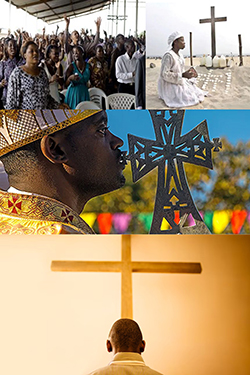 The gospel of Jesus Christ is the message of the church’s mission. It is a message of love, grace, forgiveness and salvation. However, many messages that are taught at mission rallies, crusades and conferences or preached in churches across sub-Saharan Africa differ significantly from the gospel that the apostles of Jesus and the early church proclaimed. The most prominent of these other gospels is the prosperity gospel, but it is not the only one. There are other “other gospels” whose impact on the African church and its mission should not be underestimated. Among these messages are the power gospel, the hyper-grace gospel and the gospel of legalism. The power gospel lacks the Christ and cross-centredness of the apostolic gospel, and while the hyper-grace gospel twists the biblical concept of grace, the legalistic gospel is short of it. With its emphasis on the outward manifestations of the Holy Spirit, the power gospel has led to a redefinition of spirituality. The marks of Christian discipleship and leadership are no longer godly conduct and maturity but the exercise of power. The hyper-grace gospel has contributed to this paradigm shift by claiming that there is no need for ongoing repentance anymore. Sin has no place in hyper-grace preaching, whereas the gospel of legalism declares the disregard of certain rules and regulations as sinful, which are not sinful in a scriptural sense.
The gospel of Jesus Christ is the message of the church’s mission. It is a message of love, grace, forgiveness and salvation. However, many messages that are taught at mission rallies, crusades and conferences or preached in churches across sub-Saharan Africa differ significantly from the gospel that the apostles of Jesus and the early church proclaimed. The most prominent of these other gospels is the prosperity gospel, but it is not the only one. There are other “other gospels” whose impact on the African church and its mission should not be underestimated. Among these messages are the power gospel, the hyper-grace gospel and the gospel of legalism. The power gospel lacks the Christ and cross-centredness of the apostolic gospel, and while the hyper-grace gospel twists the biblical concept of grace, the legalistic gospel is short of it. With its emphasis on the outward manifestations of the Holy Spirit, the power gospel has led to a redefinition of spirituality. The marks of Christian discipleship and leadership are no longer godly conduct and maturity but the exercise of power. The hyper-grace gospel has contributed to this paradigm shift by claiming that there is no need for ongoing repentance anymore. Sin has no place in hyper-grace preaching, whereas the gospel of legalism declares the disregard of certain rules and regulations as sinful, which are not sinful in a scriptural sense.
There is both a need for a pastoral response that welcomes those affected by these other gospels and a need for biblical teaching that is contextual and helps Africans deal with the manifold challenges of life on their continent. However, the ultimate antidote to these other gospels is the Christ-centred, cross-centred and grace-centred gospel as we find it in the Scriptures.
Uploaded/Published : July 18, 2024 | ERTP Vol 12, 2024, pages, A91-106
Article: 2024-7
Robert F. Krise
‘Wokeness and Racism:
Contemporary Challenges to the Evangelical Church’
KEY WORDS
|| Church || Critical Race Theory || Evangelical ||
|| Racism || Repemtance || Wokeness||
ABSTRACT The Evangelical church has faced challenges throughout its history and today is no exception. Currently, the “wokeness” challenge comes as a movement stressing help and hope for the downtrodden. From this movement, organizations such as Black Lives Matter have arisen to address some of the racial issues that exist in this country. However, as the “woke” movement has progressed, many of the principles espoused in wokeness hinder or contradict the foundational principles that the church has long held, bringing confusion to the church’s purpose and mission. These factors, promoted by the wokeness movement, have created theological pressure within the Evangelical church, causing it to adapt to the new “woke” philosophies and drawing it away from biblical doctrine. Consequently, the Evangelical church has drifted away from its purpose, and it is faced with the need to return to its biblical roots. The first three chapters of the Revelation of John provide insightful directions for repentance and restoration for the church. Through repentance and careful examination of biblical teaching, those who are part of the Evangelical church can
The Evangelical church has faced challenges throughout its history and today is no exception. Currently, the “wokeness” challenge comes as a movement stressing help and hope for the downtrodden. From this movement, organizations such as Black Lives Matter have arisen to address some of the racial issues that exist in this country. However, as the “woke” movement has progressed, many of the principles espoused in wokeness hinder or contradict the foundational principles that the church has long held, bringing confusion to the church’s purpose and mission. These factors, promoted by the wokeness movement, have created theological pressure within the Evangelical church, causing it to adapt to the new “woke” philosophies and drawing it away from biblical doctrine. Consequently, the Evangelical church has drifted away from its purpose, and it is faced with the need to return to its biblical roots. The first three chapters of the Revelation of John provide insightful directions for repentance and restoration for the church. Through repentance and careful examination of biblical teaching, those who are part of the Evangelical church can
once again participate in the fulfillment its divine purpose,
leading the church back to its evangelical roots.
Uploaded/Published : December 31, 2024 | ERTP Vol 12, 2024, pages, A107-122
REVIEW ARTICLES
Review Article
An Evaluation of the Recent Bible Translations
by Goldingay (2018) and McKnight (2023)
John Goldingay, The First Testament: A New Translation. Downers Grove, IL: IVP, 2018. Pp. 1200. ISBN: 978-0830851997.
Scot McKnight, The Second Testament: A New Translation. Downers Grove, IL: IVP, 2023. Pp. 312. ISBN: 978-0830846993.
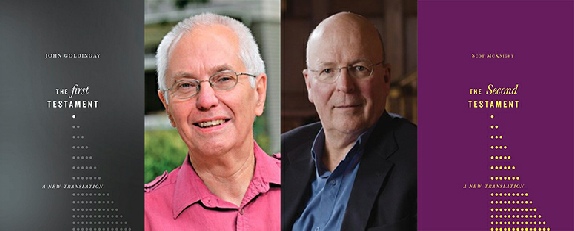
KEY WORDS
|| Bible || Translation || Evangelical || Interpretation ||
|| Greek || Hebrew || Aramaic ||
Abstract: In the last decade there have been several new translations of both the old and new testaments that have been published by individual scholars, and each has its own promises and pitfalls. In the work of Bible translation there are always elements of interpretation, and as more biblical manuscripts have been discovered in recent years there remain continuous efforts to better shape our understanding of the ancient text. In this article, I will evaluate the recent Bible translations by Goldingay (2018) and Mcknight (2023), noting how these translations are different than previous translations and what makes them distinct. In this examination, I will draw attention to specific passages that are either difficult to translate or are controversial in the way that they are translated, evaluating how Goldingay and McKnight handle such texts in comparison with previous translations. This analysis seeks to help readers understand that while every modern translation has its promises and its pitfalls, Goldingay and McKnight have provided unique and interesting versions that can especially benefit better-educated readers.
Reviewed by William B. Bowes
Uploaded/Published : August 8, 2024 | ERTP Vol 12, 2024, pages, RA1-8

Home || Contents || Reviews || Full Journal || For Authors || Contact Us
The Evangelical Review
Copyright 2013 © King's Divinity Press © King's Evangelical Divinity School and © Ash Design


The Evangelical Review, Vol.1, (2013)
The Evangelical Review, Vol.2, (2014)
TER Vol. 2, (2014) ‘Thy Kingdom Come’ Conference Papers
The Evangelical Review, Vol. 3, (2015)
TER Vol. 3, (2015) ‘Christianity & Culture’ Conference Papers
The Evangelical Review, Vol. 4, (2016)
The Evangelical Review, Vol. 5, (2017)
TER Vol. 5, (2017) ‘Purge the Old Leaven’ Essay Series
The Evangelical Review, Vol. 6, (2018)
The Evangelical Review, Vol. 7, (2019)
The Evangelical Review, Vol. 8, (2020)
TER Vol. 8, (2020) ‘Homosexuality:
The Case For & Against’ Essay Series
The Evangelical Review, Vol. 9, (2021)
The Evangelical Review, Vol. 10, (2022)
The Evangelical Review, Vol. 11, (2023)
The Evangelical Review, Vol. 12, (2024)
|
The Evangelical Review ~ Vol. 12, 2024 |
|||
|
Contents ~ Pagination |
|||
|
Articles |
|
||
|
Matthew Wong |
A1 - 28 |
||
|
Zach Doppelt, part 1 |
A29-48 |
||
|
Zach Doppelt, part 2 |
A49-66 |
||
|
Daniel Kirkpatrick |
A67-78 |
||
|
Joshua J.W. Yen |
A79-90 |
||
|
Thorsten Prill |
A91-106 |
||
|
Robert F. Krise |
A107-122 |
||
|
|
|
||
|
Review Articles |
|
||
|
Goldingay and McKnight |
RA1-8 |
||
|
|
|
||
|
Book Reviews |
|
||
|
Review of Watkins |
BR1-2 |
||
|
Review of Longman III |
BR3-6 |
||
|
Review of Anslow |
BR7-10 |
||
|
Review of Lynch |
BR11 - 14 |
||
|
Review of Elder |
BR15-18 |
||
|
Review of Edwards |
BR19-20 |
||
|
Review of Quarles & Kellum |
BR21-24 |
||
|
|
|
||
|
|
|
||
|
|
|
||
Review: 2024-01
Christopher Watkin.
Biblical Critical Theory:
How the Bible’s Unfolding Storyline
Makes Sense of Modern Life and Culture
Grand Rapids, MI: Zondervan Academic, 2002.
hc, xxiii+648. $26.29, £25.00. ISBN 978-0-310-12872-4.
Reviewed by Walter Lamberti.
Uploaded/Published : January 28, 2024 | ERTP Vol 12, 2024.
pages, BR1-2.
Review: 2024-02
Tremper Longman III.
The Fear of the Lord is Wisdom:
A Theological Introduction to Wisdom in Israel
Baker Academic, Grand Rapids (2017).
pp. 336 £24.50 ISBN: 080102711X.
Reviewed by Daniel Martin.
Uploaded/Published : February 2, 2024 | ERTP Vol 12, 2024.
pages, BR3-6.
Review: 2024-03
Matthew Anslow.
Fulfilling the Law and the Prophets:
The Prophetic Vocation of Jesus in the Gospel of Matthew
Eugene, OR: Pickwick, 2022.
Pp. 394 £61.36 ISBN: 166672341X.
Reviewed by Rubin James Yi McClain.
Uploaded/Published : February 29, 2024 | ERTP Vol 12, 2024.
pages, BR7-10.
BOOK REVIEWS
Review: 2024-04
Matthew J. Lynch.
Flood and Fury:
Old Testament Violence and the Shalom of God
Reviewed by Stephen M. Vantassel.
Uploaded/Published : May 21, 2024 | ERTP Vol 12, 2024.
pages, BR11-14.
Review: 2024-05
Nicholas A. Elder.
Gospel Media: Reading, Writing, and Circulating Jesus Traditions
Reviewed by Timothy N. Mitchell.
Uploaded/Published : July 9, 2024 | ERTP Vol 12, 2024.
pages, BR15-18.
Review: 2024-06
Mark Edwards.
The Problem of Evil in the Ancient World:
Homer to Dionysius the Areopagite
Reviewed by Joshua Jo Wah Yen.
Uploaded/Published : July 11, 2024 | ERTP Vol 12, 2024.
pages, BR19-20.
Review: 2024-07
Charles L. Quarles and L. Scott Kellum.
40 Questions About the Text and Canon
of the New Testament
Reviewed by Clark R. Bates.
Uploaded/Published : September 5, 2024 | ERTP Vol 12, 2024.
pages, BR21-24.
Illustration adapted from one by “Heath” in The Spectator 27 Dec., 2023